These History-Making Columbia Women Have Their Own Commemorative U.S. Postage Stamps
Signed, sealed, and delivered: these Columbia women made their mark on the world and your mailbox.
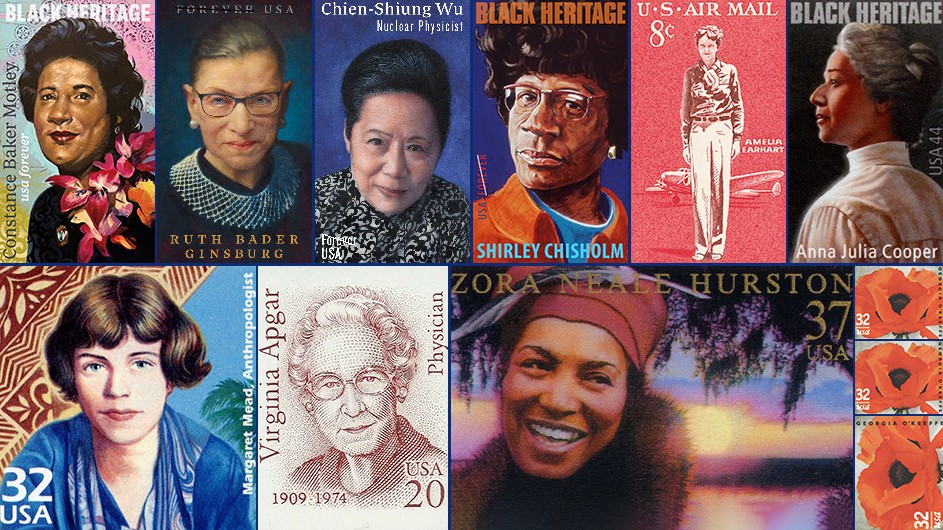
From the arts to the sciences, anthropology to the Supreme Court, women who were molded by their experiences at Columbia University have left an indelible mark on our city, country, and world.
This Women's History Month, we're looking back at the Columbia women whose accomplishments are so iconic they have been enshrined in U.S. commemorative postage stamps, which honor events, activities, or people of national importance.
We hope the list below serves as an inspiration and a reminder that signed, sealed, and delivered, Columbia women have been and continue to be some of the world's greatest.
Virginia Apgar (VPS 1933)
First Woman Professor at Vagelos College of Physicians and Surgeons, Developed APGAR Score
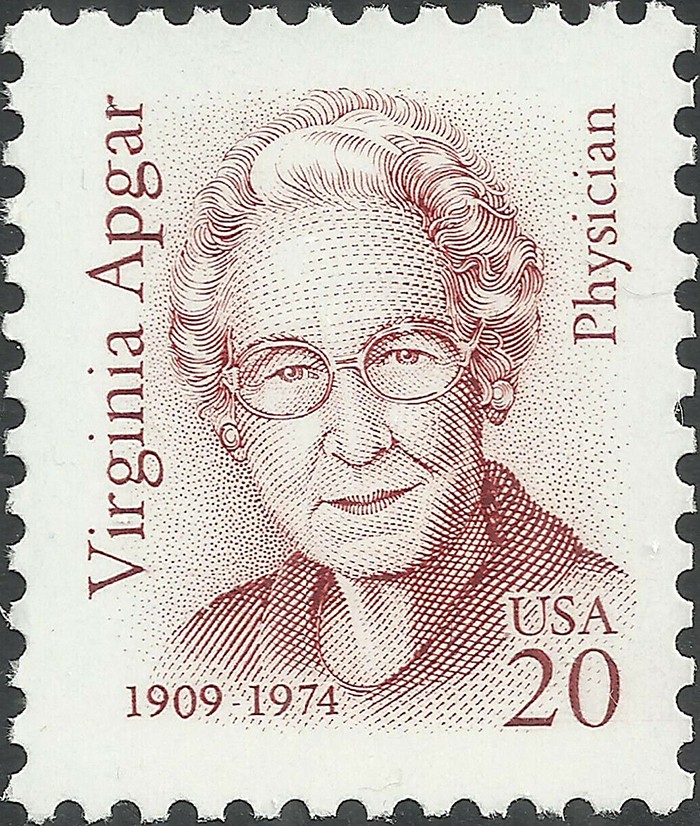
After graduating fourth in her class at Vagelos College of Physicians and Surgeons (VPS) in 1933, Virginia Apgar specialized in anesthesia. In 1949, she was appointed the first woman professor at the VPS.
Three years later, while researching obstetric and pediatric anesthesia, she developed the APGAR Score, which is used the world over to check a baby's Activity (muscle tone), Pulse (heart rate), Grimace (reflex irritability), Appearance (coloration of skin), and Respiration to see if emergency medical intervention is needed.
Apgar developed many other innovations and it is to her we owe the establishment of the subspecialties of perinatology and neonatology, the development of neonatal intensive care units, and the entire field of neonatal research.
The Virginia Apgar stamp was issued on October 24, 1994.
Ruth Bader Ginsburg (LAW'59)
First Woman Tenured Professor at Columbia Law School, U.S. Supreme Court Justice

When Ruth Bader Ginsburg, or RBG as she is fondly known, graduated from Columbia Law School in 1959, she tied for first in her class.
In 1972, she became the first female tenured professor at the Law School. She would become known for "breaking glass ceilings, winning important victories for gender equality, and making history in the country’s highest court" as the second woman to sit on the U.S. Supreme Court.
The Ruth Bader Ginsburg stamp was issued on October 2, 2023.
Shirley Chisholm (TC'52)
First Black Woman Elected to Congress
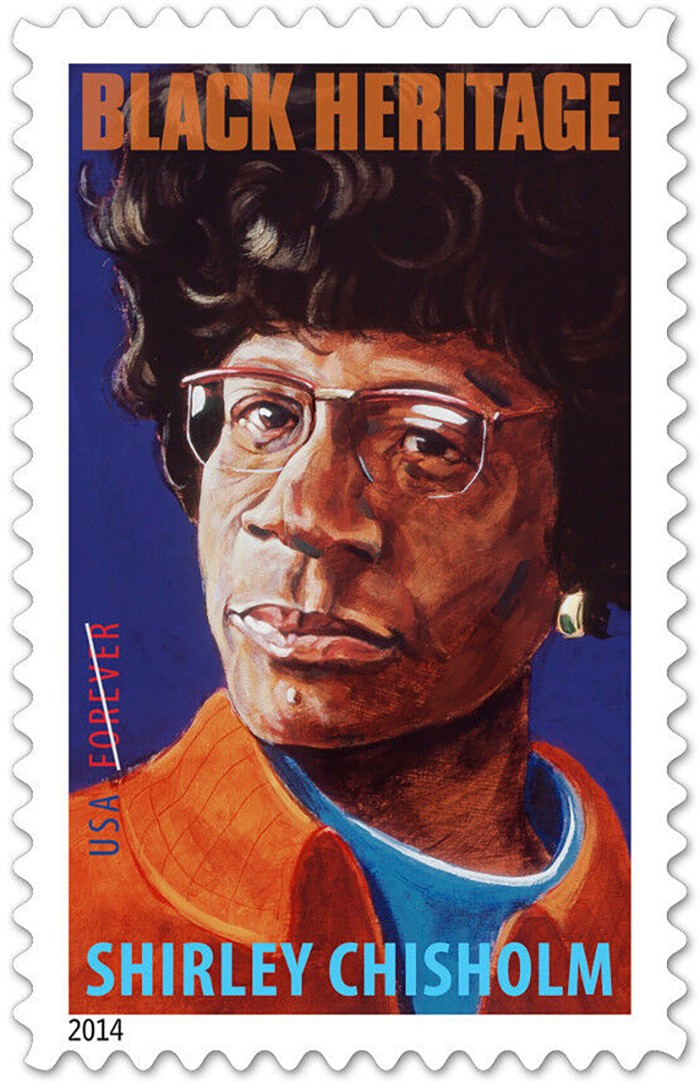
After graduating from Teachers College in 1952, Shirley Chisholm went on to become the first Black woman elected to Congress and the first to seek a major party’s presidential nomination.
"Unbought and unbossed" was her famous slogan, which "resonated with many voters by expressing her clear dissatisfaction with the Washington status quo." She was a tireless advocate for a more diverse political landscape.
“I enrolled in TC to follow a career in the classroom, because I felt then, as I feel now, that education is the only real passport out of poverty,” wrote Chisholm. “At the time, my only ambition was to use whatever gifts I had to open the door for others. TC taught me how to do that, but it taught me something more: the value of hard work, an appreciation of good colleagues, the pride that comes with achieving high goals.”
The Shirley Chisholm stamp was issued on January 31, 2014.
Anna Julia Cooper (GSAS PhD student 1914-15)
Champion of Education for All
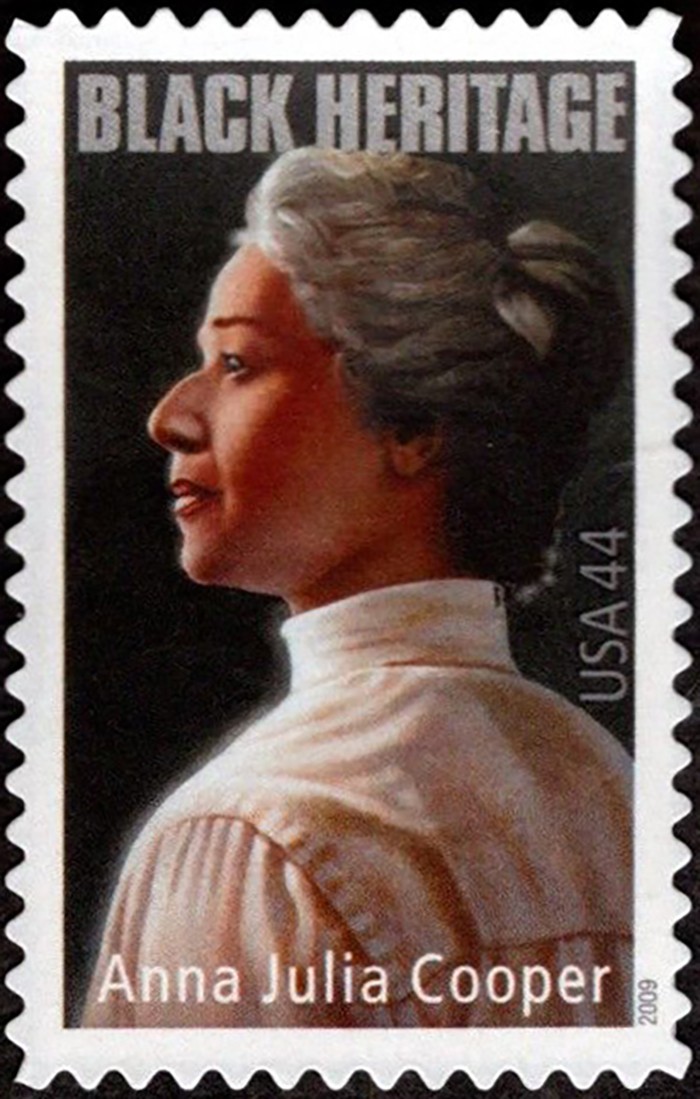
From the end of slavery to the Civil Rights movement, Anna Julia Cooper would rise to prominence as an educator, scholar, and activist who championed education for African Americans and women.
Born into bondage in 1858 in Raleigh, North Carolina, Cooper would go on to publish A Voice from the South by a Black Woman of the South in 1892. In addition to calling for equal education for women, A Voice from the South advanced Cooper’s assertion that educated African American women were necessary for uplifting the entire Black race.
"The cause of freedom is not the cause of a race or a sect, a party or a class—it is the cause of human kind, the very birthright of humanity," Cooper wrote.
Cooper would also establish and co-found several organizations to promote Black civil rights causes and pursued graduate study at Columbia University from 1914 to 1915.
The Anna Julia Cooper stamp was issued on June 11, 2009.
Amelia Earhart (GS Student 1919-20, 1925)
First Woman Aviator to Fly Solo Across the Atlantic
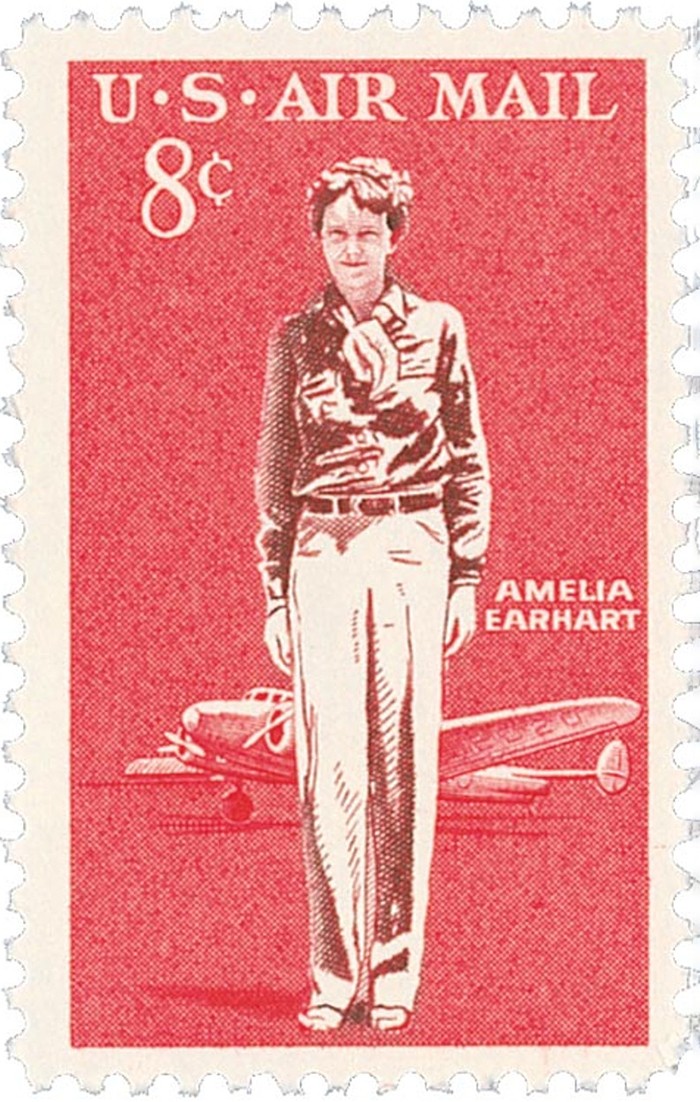
Perhaps the most famous female aviator of all time, Amelia Earhart attended Columbia University’s School of General Studies from 1919-1920 (and again, briefly, in the spring of 1925) intending to go on to medical school. Though discovering aviation shifted her career goals away from medicine, according to Columbia Libraries, she did make full use of her time at Columbia to explore the campus.
"I was familiar with all the forbidden underground passageways which connected the different buildings of the University," Earhart wrote in her memoir. "I think I explored every nook and cranny possible. I have sat in the lap of the gilded statue which decorates the library steps, and I was probably the most frequent visitor on the top of the library dome. I mean the top."
Earhart was a woman of many firsts, but her solo flights across the Atlantic and across the North American continent made her a star. In 1937, Earhart attempted to fly around the world and disappeared, a mystery that has not been solved to this day.
A letter before her last flight read: “Please know that I am quite aware of the hazards. I want to do it because I want to do it. Women must try to do things as men have tried. When they fail, their failure must be but a challenge to others.”
The Amelia Earhart stamp was issued on July 24, 1963.
Margaret Mead (BC 1923, GSAS 1929)
Columbia Professor, Instrumental Anthropologist
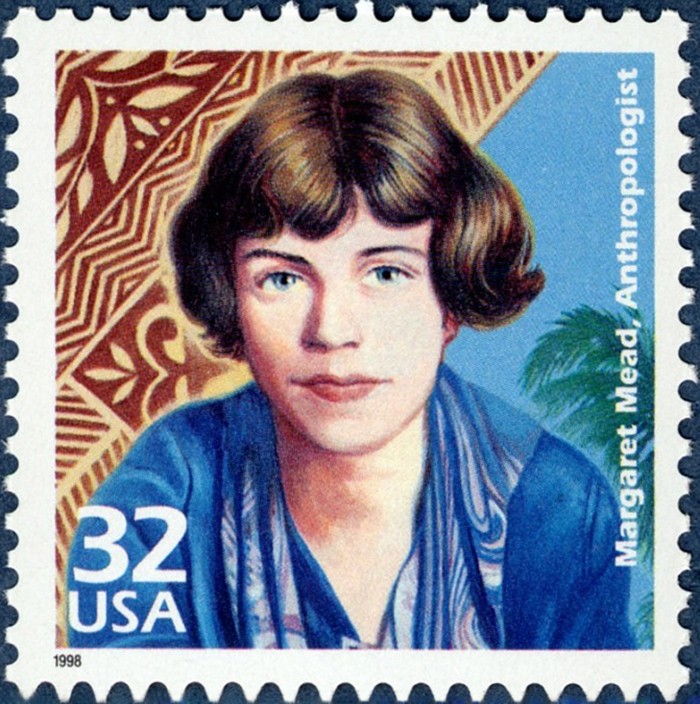
Margaret Mead was a force of nature who was instrumental in extending and popularizing the anthropological concept of culture. Mead transferred to Barnard College in 1921, majored in psychology, and graduated in 1923. From Barnard, Mead proceeded across Broadway to Columbia, where she pursued graduate studies in anthropology with Franz Boas and Ruth Benedict. She received her PhD in 1929.
As a professor, intrepid researcher, author, speaker, and museum curator, she bridged the gap between the academy and popular culture. She first made her mark with Coming of Age in Samoa, published in 1928 and based on original fieldwork done for her PhD at Columbia.
In 1934, she became a member of the curatorial staff at the American Museum of Natural History, with which she remained affiliated until she died in 1978. Mead taught off and on at Columbia well into the 1970s. Throughout her life, Mead's work focused on problems of child-rearing, personality, and culture and in the process assured the inclusion of perspectives of women and children within the scope of anthropological work.
“Never doubt that a small group of thoughtful, committed, citizens can change the world," Mead is attributed with saying. "Indeed, it is the only thing that ever has.”
The Margaret Mead stamp was issued on May 28, 1998.
Constance Baker Motley (LAW'46)
First Black Woman to Serve as a Federal Judge, Pioneering Civil Rights Lawyer with the NAACP Legal Defense and Educational Fund
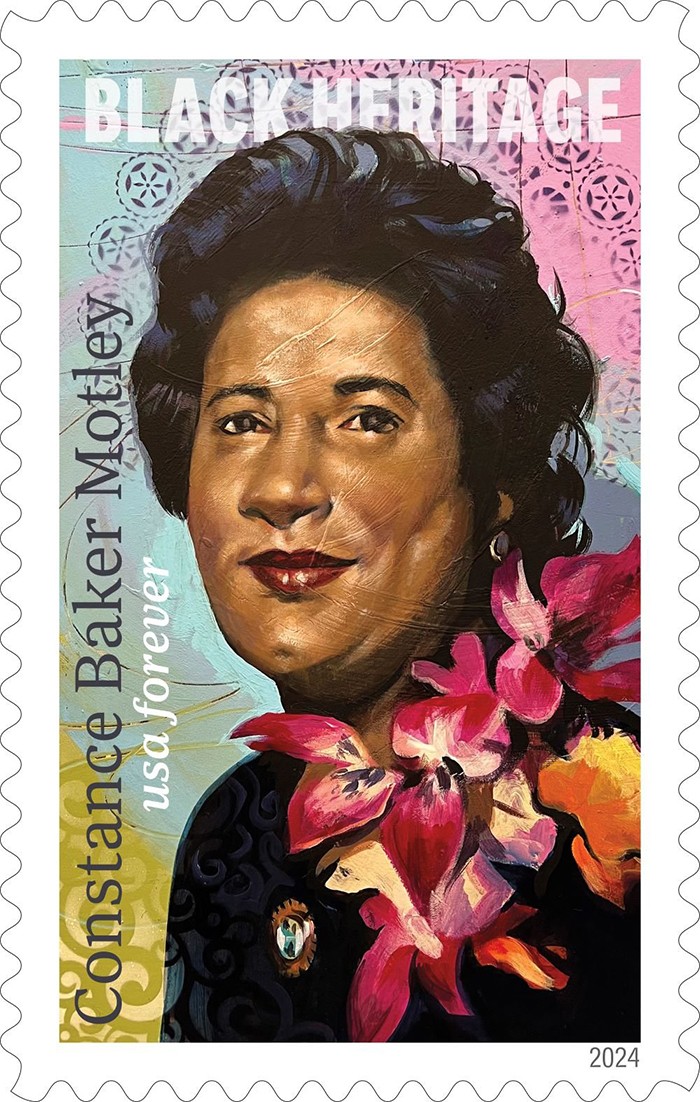
Constance Baker Motley was the second Black woman to graduate from Columbia Law School, but she is second to none in consequential contributions to the Civil Rights Movement. She was an integral member of the NAACP Legal Defense and Educational Fund (now called the Legal Defense Fund) team that wrote the briefs for Brown v. Board of Education. Motley also spearheaded the 1960s court cases that desegregated the University of Georgia and the University of Mississippi.
In 1966, after a brief stint in New York politics as the first Black woman to be elected a state senator and Manhattan borough president, Motley was appointed by President Lyndon B. Johnson to the U.S. District Court for the Southern District of New York, where she served full time until 1986. She became the first Black woman to serve as a federal judge.
The Constance Baker Motley stamp was issued January 31, 2024.
Zora Neale Hurston (BC 1928, GSAS)
First Black Graduate at Barnard College, Harlem Renaissance Writer
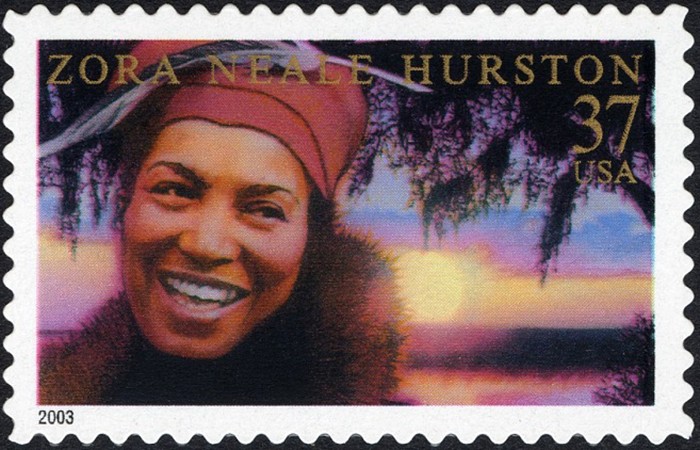
Zora Neale Hurston combined literature with anthropology, employing indigenous dialects to tell the stories of people in her native rural Florida and in the Caribbean. She became one of the most widely read authors of the Harlem Renaissance but died penniless and forgotten, her eight books long out of print. Her work was brought back to the public's attention in Alice Walker's 1975 essay, "In Search of Zora Neale Hurston," which led to the rediscovery of her novel Their Eyes Were Watching God (1937).
A published short story writer by the time she came to New York in 1925, Hurston studied anthropology at Barnard, where she was the college's first African-American student. After graduation at the age of 37, Hurston later pursued graduate work at Columbia with renowned anthropologist Franz Boas. She left New York to conduct research in Florida and in Haiti, her fieldwork resulting in the folklore collections Mules and Men (1935) and Tell My Horse (1938). At Columbia, the Zora Neale Hurston Professorship of English honors her life and work.
The Zora Neale Hurston stamp was issued on January 24, 2003.
Georgia O'Keeffe (TC Student 1914-15)
First Woman with Solo Exhibition at Museum of Modern Art, American Modernist Painter
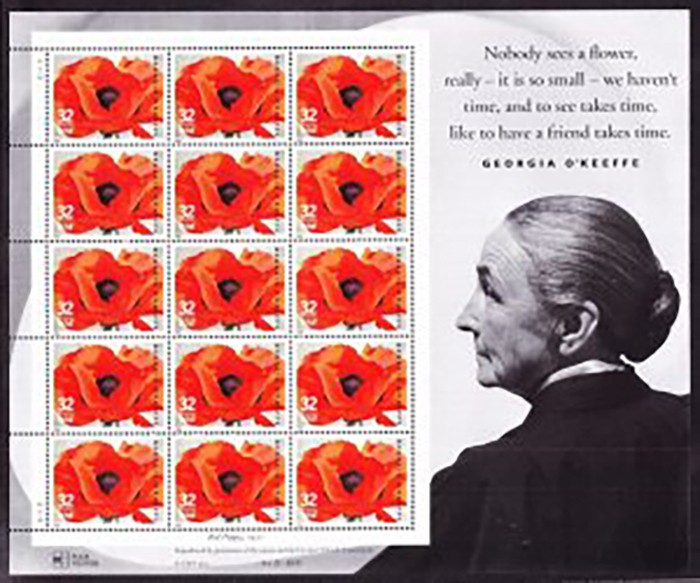
The incomparable painter Georgia O'Keefe holds many distinguished honors, including that she was the subject of the first solo exhibition ever given to a woman at the Museum of Modern Art.
Before she made her name in the avant-garde movement and became known for her large-scale paintings of flowers and the American Southwest, she came to Teachers College in 1914 and 1915 to learn from Arthur Wesley Dow, who saw art as a representation of the artist's personal feelings. Her time at Teachers College rekindled O'Keeffe's interest in painting, which she had stepped away from three years earlier.
The Georgia O'Keeffe stamp was issued on May 23, 1996.
Chien-Shiung Wu
First Woman Tenured Professor at Columbia Physics, 'First Lady of Physics'
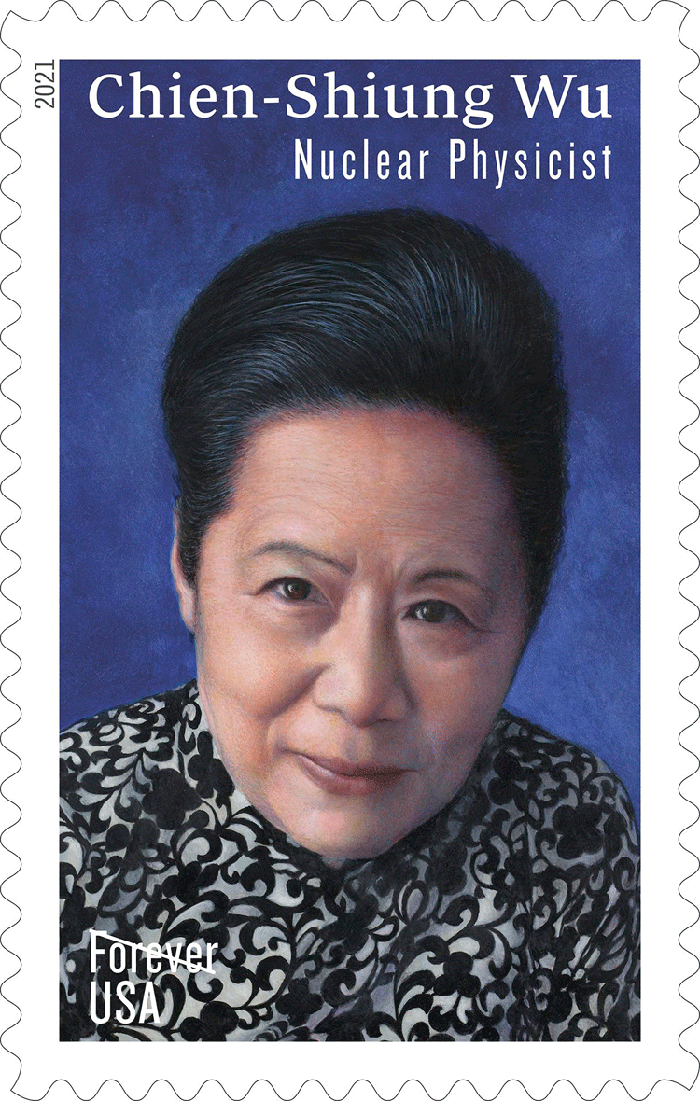
Chien-Shiung Wu led a life of many firsts: the first female president of the American Physical Society, the first woman hired by Columbia Physics Department as a tenured faculty member, and the first living scientist to have an asteroid named in her honor.
Wu’s pioneering work altered the way scientists view the structure of the universe. Her most definitive achievement was her 1956 experiment that disproved the "law of parity conservation,” once considered an immutable law of physics. This discovery, lauded as one of the most important developments in the field of atomic and nuclear physics, established that the laws of nature are not always symmetrical.
The Chien-Shiung Wu stamp was issued on February 11, 2021.
And: Madam C.J. Walker
Haircare Mogul and Philanthropist
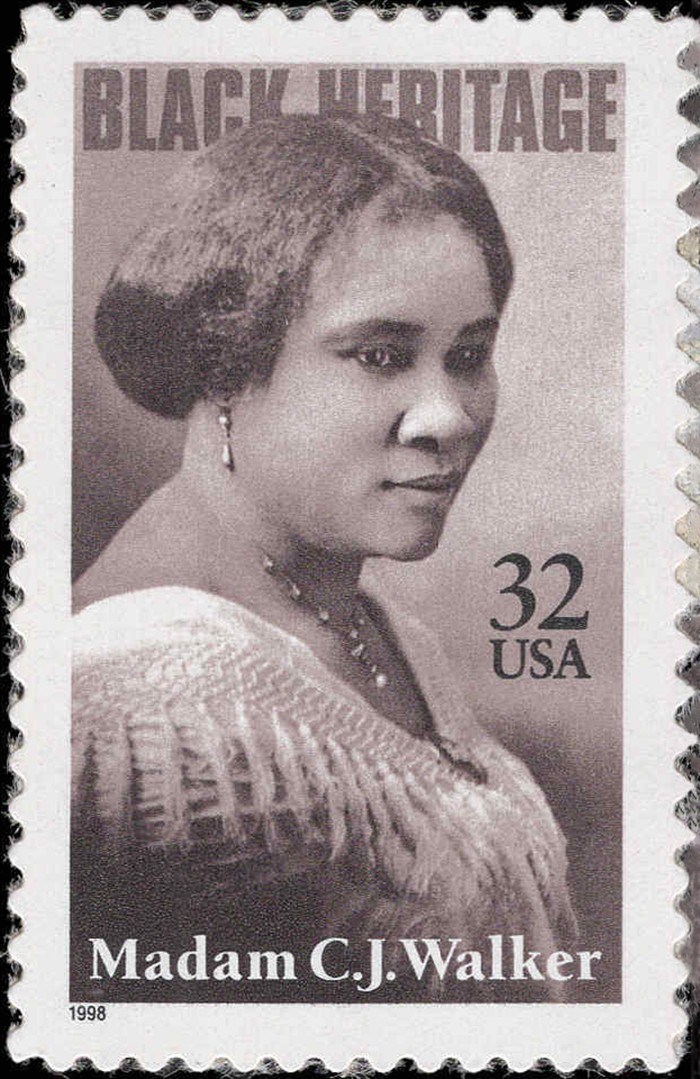
While business mogul Madam C.J. Walker, born Sarah Breedlove, was not a student at Columbia University, we like to think of her as one of ours. Her great-great-granddaughter A'Lelia Bundles is both Walker's biographer and a Columbia Trustee Emerita, and her name adorns the A'Lelia Bundles Community Scholars program at the University.
Walker was the first American female millionaire, making her name in the world through her revolutionary hair products as the leader of one of the country’s largest African American-owned businesses in her time. She was also a dedicated philanthropist, a legacy her family carries on.